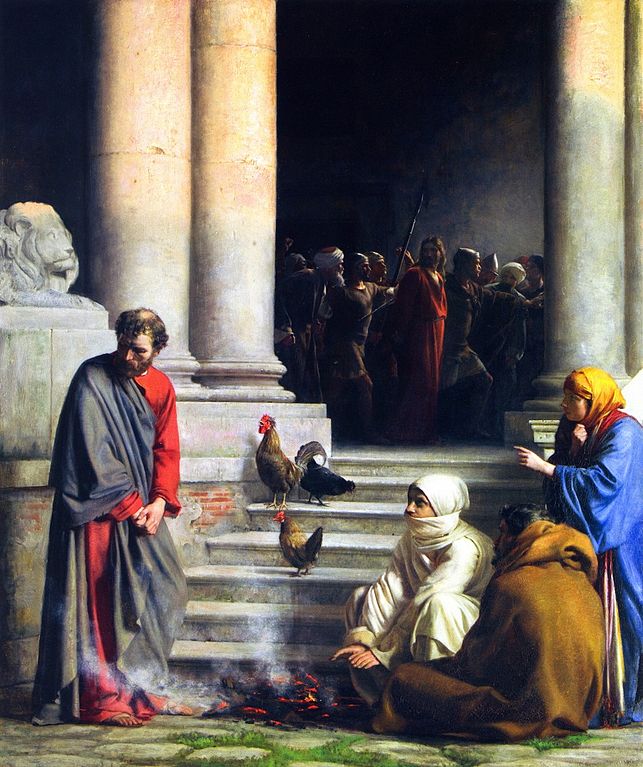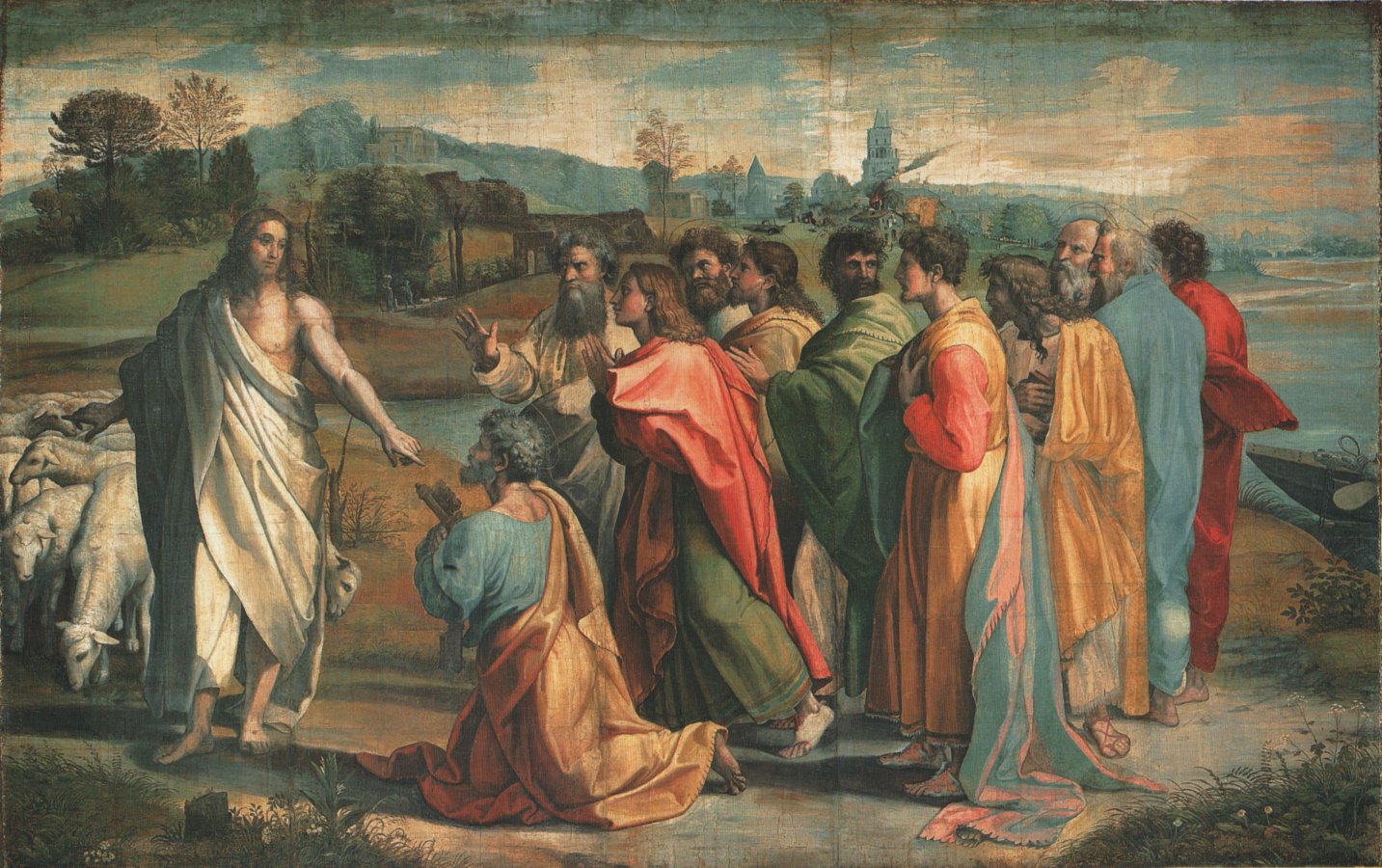You and I are not wholly ourselves. Expressions such as, “I wasn’t myself” and “When I came to myself,” show that we grasp, at some level, that there can be a gap between who we understand ourselves to be and how we behave and choose. We are divided. The selves as whom we live are dissipated and dissevered between contradictory drives and desires, between opposing senses of who and what we must be. We pursue visions of life but find they are ways of death (Prov 14:12), discovering too late that these things are not what we, in the parts of ourselves we consider or hope to be the truest, actually desire. We are not whole, and so cannot give ourselves wholly to anything or anyone.
“Teach me your way, O Lord,” the Psalmist writes; “unite my heart to fear your name” (Ps 86:11). The human authors of scripture repeatedly implore their God to show them and us his ways, to reveal the way through and out of the darkness and devastation of our world. God’s ways are the ways of Jesus Christ, the living Way, the union of Earth and heaven. He is the tangibility of the love of the Creator, wholeness come amongst those infected with nothingness.
Those who yearn for closeness with the Lord painfully confront their dividedness in their encounters with him. We long for the affectionate recognition of our Maker, of the One who is the author of goodness and love. The Lord is one: an undivided, perfect coincidence between being and action, against whom we cannot but compare ourselves and find ourselves lacking. And so who we are is less innate than we often imagine it to be; faithfulness to ourselves cannot guarantee dignity or integrity or wholeness. For true personhood emerges in the event of faith which recognizes and accepts the Lord’s claim upon it.
The fifth century theologian Augustine writes in Sermon 295 that Peter “discovered himself” in his repudiation of Jesus. He who had been so sure of himself, who had vowed to die with Jesus if necessary, found himself denying his Lord to preserve his life. Peter wept bitterly when Jesus looked at him “because he had known how to love,” Augustine observes. Peter had never feigned this love in the past, but his overconfidence concealed from his own awareness what he loved and to what extent.

Peter was lying when he said, “I do not know him,” yet simultaneously was disclosing something true: the “I” that could deny Jesus did not know him as one to be followed unto death. Peter’s actions demonstrated that, in the most important sense possible, he did not actually know his master. But it is only in this painful, shocking breach of faith that Peter discovers what he truly is. He is a man of great passion and fierce love, but also one who ultimately is ruled by fear. Someone who boasts of his readiness to die with his master, but does not reckon with what his words mean.
After his resurrection, it was not enough that Jesus prove his claims to his followers: this reckoning had to take place and be resolved. Peter had to be remade anew. He is demoralized and ashamed. His brokenness has become an existential fact he can no longer conceal from himself or anyone else. But Jesus cannot leave him in this place. Jesus wipes away Peter’s failure and speaks into existence a new Peter who will make good on his promise. For love covers all transgressions, the compiler of Israel’s wisdom writes (Prov 10:12), and this will be impressed upon Peter in such a transformative way that he will appropriate this near the end of his life in a letter to those in his pastoral care: “Above all, keep loving one another earnestly, since love covers a multitude of sins” (1 Peter 4:8).
Jesus covers Peter’s transgressions by asking him three times if Peter loves him. Reflecting on this, Augustine writes,
Do not be sad, Apostle. Answer once, answer again, answer a third time. Let confession conquer three times with love, because self-assurance was conquered three times by fear. What you had bound three times must be loosed three times. Loose through love what you had bound by fear.
The beauty of this moment is that Jesus does not disown the one who had failed to keep his promise or repudiate the one who had repudiated him. Jesus does not ask the same question three times to provoke in Peter the kind of guilt “necessary” to make right what went wrong. For there is not a requisite level of guilt that will necessarily produce good and substantive change. Jesus is not shaming Peter into a guilty plea.
Jesus leads Peter past the wreckage of his failure with the very keys he gifted to Peter at Caesarea Philippi. Whatever he binds will remain bound, and whatever he looses will be loosed, in heaven as it is on earth (Matthew 16:19). Peter’s denial, fettered in and by fear, must be nullified not only by Peter’s love but by Jesus’s as well.

Augustine writes, “Loose through love what you had bound by fear.” This is no condition to be met or legalistic demand: this is the way out of the maelstrom that opens up in our faithlessness, the way we leave behind our failures to become what we have been called to be. All of us need this continually. None of us are capable of battering down the doors of our own self-exclusion. We all need the keys to release us from our own imprisonment.
Having negated Peter’s threefold repudiation, Jesus promises him, “Truly, truly, [literally, “Amen, amen”] I say to you when you were young, you used to dress yourself and walk wherever you wanted, but when you are old, you will stretch out your hands, and another will dress you and carry you where you do not want to go” (Jn 21:18). So that its significance is not lost, an editorial note adds that Jesus said this to “show by what kind of death he was to glorify God” (verse 19).
This double amen is the first Jesus has spoken to Peter since Peter’s brash assertion that he would lay down his life for Jesus (Jn 13:37). Peter’s claim is a retort to Jesus telling him he cannot follow Jesus now “but will afterward” (verse 36). “Will you lay down your life for me?” Jesus asked him then. “Truly, truly, I say to you, the rooster will not crow till you have denied me three times” (verse 38). The reader of John’s Gospel assumes that “following” in this instance refers solely to Jesus’s atoning death: of course Peter cannot follow, for only Jesus can defeat Sin and Death by sacrificially giving himself. But if this is the entirety of what he means, why does Jesus say that Peter will follow him afterward?
It is because Peter, at this point, cannot follow Jesus. Whatever aspect of him wants to follow his master unto death does not prevail over other drives and desires. So when Jesus reconstitutes Peter, he assures him that he will, in fact, love Jesus unto death. After foretelling Peter’s martyrdom, Jesus tells him, “Follow me” (Jn 21:19). This Peter can and will. This Peter’s love will not fail.
The freedom to love is manifested most ultimately in the surrendering of what is most precious to us: ourselves. And that freedom is the consequence of an act of creation, an assembling and binding together of the jagged pieces of our lives into an altogether new person. Someone who can remember all for which they are responsible, but is not constrained by the paths their previous failures would immovably set.
It is not, therefore, that we arrive at our true and best self or unlock some secret fullness of ourselves through sufficient effort. We are incomplete; our being as creatures is one of lack and need, of striving to fill what is lacking. But we cannot do this ourselves. When we become ourselves it is a gift of grace in which the Spirit of God hovers over the chaos of humanity and beckons a new creation to emerge, one born out of Jesus Christ’s own giving of himself unto death (Jn 12:24).
The fearful, faithless Peter was not restored by Jesus; he was born again.
Peter never became perfect in this vale of tears; he would fail yet again (Gal 2:11-14). But when the time came, he proved himself ready to love like his master, ready to lay down his life for the gospel with which he was entrusted. He did not remain encumbered by the weight of what he had done in the past. Peter’s compromises and mishaps and outright transgressions did not impede him from witnessing to the power of Jesus Christ to obliterate what is dead and useless and to usher in life.
As with Peter, our failures are absorbed by a love that is stronger than death. And in the place of failure there is faithfulness to a God who has rescued us and freed us from fear.
“Do not be sad, Apostle,” Augustine comforts the long-departed Peter. The once wayward bishop can no doubt recognize similarities between himself and the apostle, can recognize that the record of any ledger of worthiness could verify that he is as undeserving of his post as Peter is of his. Augustine addresses Peter with the gentleness of a parent consoling her child who knows they have done wrong. Augustine seems to lift Peter’s chin and gaze with affection into his bleary eyes, wiping away the tears still gathered beneath them, to comfort him with the grace that became flesh in Jesus Christ — the One who negates our unworthiness and creates faithfulness out of nothing.

COMMENTS
2 responses to “A Love Unto Death”
Leave a Reply













“Do not be sad, Apostle… Loose through love what you had bound by fear.”
Augustine just kills me sometimes.
Wonderful piece. Thanks, Ian!
Indeed, It’ reminds me of a country song.
“How’d you turn the other cheek,
To save a sorry soul like me?”